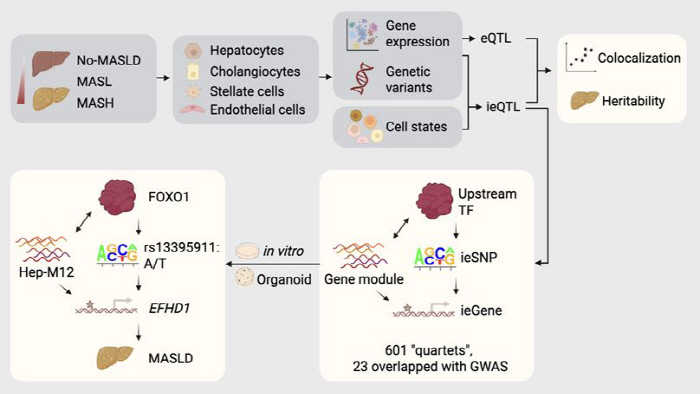Suggesting the possibility of customized treatment for liver disease...find answers on genetic maps
|
Professor Kim Won of the Department of Gastroenterology at Seoul Boramae Hospital, Professor Choi Moo-rim of Seoul Medical University, and Dr. Hong Seong-eun of Samsung Medical Center discovered genetic mutations that cause the progression and deterioration of MASLD at the single cell level for the first time in the world.
In particular, this study is significant in that it was conducted on a patient cohort composed of various races, including East Asians, unlike existing Western-centered genome studies.
Although the genetic aspects of MASLD may vary by race, precise analyses that can represent Asians have been rare.
The researchers precisely analyzed the liver tissue of MASLD patients and health controls using single-cell RNA analysis techniques, and identified how gene expression is regulated according to cell conditions in connection with individual genotypes.
The researchers analyzed the liver tissues of 30 patients and 24 health controls in various stages of MASLD (simple fatty liver, mild fibrosis, severe fibrosis, etc.), and obtained a total of more than 240,000 liver cell information. While existing genetic studies had limitations in reflecting only the average value of the entire tissue, this study is groundbreaking in that it accurately tracked the genetic regulation pattern according to the individual patient's cell condition.
Through this approach, the research team identified about 3500 gene expression regulatory variants (eQTLs) and discovered many of them 'interacting-eQTLs (interacting-eQTLs)' whose modulation method varies depending on the cell's condition. In particular, approximately 600 patient-specific and cell-specific gene regulation modules have been derived, which is an important basis for future patient-specific diagnosis and treatment target development.
One of the key findings of our study is the fact that FOXO1 transcription factors in patients with specific genotypes (rs13395911) are involved in the deterioration of MASLD while regulating the expression of the EFHD1 gene.
This gene regulation axis, which is involved in the deterioration of hepatocytes' metabolic function, stress response, and fat accumulation, showed the mechanism that the gene regulation function collapses and the disease progresses faster as the hepatocyte condition worsens. It has also been experimentally demonstrated that this pathway actually works through liver organoid experiments and cell models.
Choi Murim, a professor at Seoul Medical University, said "Experiment is a process that simplifies reality and reveals causes and effects, but with the advancement of technology, it is now possible to experiment that reflects the complexity of reality."This study is meaningful in that through such an approach, complex patterns of chronic diseases were reproduced at the real patient level and even patient-specific drug targets were presented."
Professor Kim Won of Boramae Hospital "As a clinical patient, we always face the reality that each patient has a different disease course and treatment response"This study identifies biological clues based on genetic-cell state that can explain the difference, which could lead to the development of a MASLD customized diagnosis and drug response prediction system using genetic information in the future."
Dr. Hong Seong-eun of Samsung Medical Center said, "A study that integrated individual genetic mutations, cell-level gene expression, and clinical information at various stages of disease to present precision medical treatment targets." He showed the possibility that genetics is useful for developing patient-specific treatments not only for rare diseases but also for chronic complex diseases."," he stressed.
This study was conducted with the support of the Korea Research Foundation (Next Generation Bio) and the Korea Health Industry Promotion Agency, and is considered a new milestone in domestic precision medical research in that it presents an analysis platform that can be applied to various chronic diseases such as high blood pressure, diabetes, and dementia in the future.
The findings were recently published in the globally influential journal 'Nature Genetics' in the field of genetics.
|
This article was translated by Naver AI translator.





